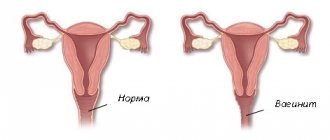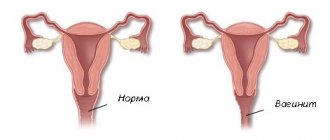In the old days, the patient’s health was assessed by the state of urine and its parameters such as color, consistency, and transparency. In the age of development of progressive technologies, this work is performed by high-precision equipment. But it is possible to determine any disorders in the body at the initial stage at home, since such an indicator as the smell of urine during pregnancy is considered quite informative, and allows you to accurately determine the state of the body of the expectant mother and fetus, the presence of diseases and pathological disorders.
Reasons for changes in urine odor during pregnancy
Why does pregnant woman's urine smell different? Pregnancy is accompanied by drastic changes in a woman’s entire body. Blood circulation, metabolism, and hormone function change. This inevitably leads to a change in the state of biological fluids.
In pregnant women, the composition of urine changes:
- the amount of albumin protein decreases, since it goes to the needs of the fetus;
- the level of creatinine decreases, which is consumed during active protein synthesis;
- The content of alkaline phosphatase increases - it is actively formed in the placenta.
These are physiological processes that do not change the color of urine. In a healthy pregnant woman, it should be yellow and transparent. The urine smells like ammonia, but not significantly. The smell may become less pronounced than before pregnancy. The aroma of urine is changed by the hormones estrogen and progesterone. Estrogen decreases and progesterone levels increase.
Physiological reasons for changes in urine odor during pregnancy include the consumption of certain foods:
- asparagus;
- fish;
- onion and garlic;
- legumes;
- coffee;
- spices.
Morning urine always has a more pronounced aroma and is darker than the rest of the day.
Physiological changes are usually not noticeable to a woman. If during pregnancy the unpleasant odor of urine becomes intense and pungent, this is an obvious sign of pathology.
Is it true that the smell of urine changes during pregnancy?
If you are planning a pregnancy, you are most likely wondering what changes will happen to your body during this wonderful state.
It is believed that one of the signs of conception is that the smell of urine changes during pregnancy.
In fact, urine is an indicator of your health and how your pregnancy will progress. That is why at every appointment at the antenatal clinic they require you to bring the result of a urine test.
But let's talk about everything in order. First, let's talk about the pregnancy planning stage.
Changes or not
The smell of urine during pregnancy is influenced by changes in hormonal levels and physiological characteristics of the female body. The change is associated with an increase in hormones and the amount of substances secreted by the kidneys.
During pregnancy, you increasingly need to go to the toilet (why is this happening? Read the article Frequent urination during pregnancy>>>).
In addition, as a result of changing hormones, your sense of smell also changes. Habitual odors may seem unpleasant, and the weakest and most insignificant ones may cause nausea and even vomiting.
Because of such a sensitive sense of smell, many expectant mothers say that the smell of urine has changed during pregnancy in the early stages.
Reasons for this reaction to urine:
- You have a normal, healthy pregnancy, but due to a more sensitive sense of smell, you begin to distinguish new shades of odors;
There is no need to treat or do anything here. Just accept the new changes in your body and your features. Slowly you will get used to pregnancy and stop paying attention to strong odors.
- Hormonal changes in the body. Already in the first weeks of pregnancy, increased production of hormones necessary for a good pregnancy begins. It is these changes that you perceive as changes in the smell of urine.
By the way! If you haven't taken a pregnancy test yet, now is the time to take one to confirm your pregnancy.
If the pregnancy did not take place, and you are still planning, then watch the course I want a child: how to prepare for the desired pregnancy and conceive a healthy child>>>
If it has changed – is it normal or pathological?
Normally, urine does not have a strong odor, although it may have a faint ammonia tint. During pregnancy, the situation is similar.
Sometimes the smell of urine may become more pronounced, but this is due to “safe” reasons. These include:
- Lack of fluid intake. In this case, the volume of urine decreases and, accordingly, it becomes more pronounced. When the drinking regime is restored, the situation returns to normal;
- Toxicosis. A phenomenon that often accompanies pregnancy. With constant vomiting, dehydration of the body occurs, changes in metabolic processes (read an important article on the topic: Vomiting during pregnancy >>>);
The result is obvious: an increase in the amount of acetone and acetoacetic acid. They are what gives urine an unpleasant odor during pregnancy. When you feel better, everything returns to normal.
Important! If the level of acetone in the urine is high, this becomes a reason for inpatient treatment of toxicosis.
- Changes during pregnancy occur when a woman consumes specific foods: spicy foods, horseradish, garlic, onions. Such products have sulfur compounds that affect urine;
Asparagus, a protein-rich food, may also be responsible for this change.
How to eat properly during pregnancy and avoid toxicosis, heartburn and constipation, see the course Secrets of proper nutrition for the expectant mother>>>
During pregnancy, some foods seem disgusting. Not because the woman is capricious. This reaction is associated with a change in the amount and composition of enzymes that break down food.
The ammonia smell is associated with the breakdown of proteins by certain enzymes.
Pathological causes
A strong smell of urine during pregnancy may indicate pathological conditions. Such a symptom may be a signal to immediately contact a specialist to receive qualified help.
A change in smell is also often accompanied by a change in a woman’s weight, well-being, change in blood pressure, and fever. Pathological causes include:
- Diabetes. Urine acquires an unpleasant aroma of rotten apples;
- With an increase in the level of leukocytes, pathogenic microorganisms, purulent formations, urine acquires an ammonia aroma, changes color and transparency;
This symptom indicates problems with the genital organs. The secretions that get into the urine affect the smell, making it unpleasant.
When the bladder becomes inflamed, urine acquires an ammonia-like odor due to fermentation processes in the urine.
Attention! If you notice a strong odor of urine, which is accompanied by other symptoms: pain, pain, fever, then immediately seek advice from a doctor.
Sometimes you need to act very quickly to save both you and the baby you are carrying.
Source: https://uroki4mam.ru/zapah-mochi-pri-beremennosti
Norm
Human urine has a slight ammonia odor. The kidneys filter enzyme substances that affect the change in the aroma of biological fluid, after which the final product leaves the body during urination.
In the mother's body, the placenta begins to produce the hCG hormone, which can be used to diagnose pregnancy using a rapid test. The hormone penetrates the bloodstream, then enters the kidneys, and after filtration settles in the bladder. When in contact with urine, it helps change its natural odor to a fresh aroma. The phenomenon is considered normal, and the specific smell disappears immediately after the birth of the child.
Human urine has a slight ammonia odor
Normal urine odor
During a normal pregnancy, a woman should monitor her own health. In most cases, the internal fluid coming out of the urethra does not have an unpleasant odor. If an abnormal amber is present, this indicates that the urine is stagnating in the bladder, where the protein compounds included in its composition are decomposing.
When carrying a child, urine tends to change its aroma. Expectant mothers note that its smell becomes sweeter and milder. This change in a woman’s body is influenced by hormonal changes in the pregnant woman’s body. At such moments, there is an increase in the level of hormones produced, as well as other substances produced by the kidneys.
Due to the growing fetus, which, displacing internal organs, begins to put pressure on the bladder, frequent trips to the restroom are observed. At the same time, the patient begins to sharply smell the smell of urine. Also, due to changes in hormones, familiar aromas become unpleasant, and those that were not noticeable before provoke the urge to vomit and release the contents of the stomach.
It is because of this that women in an interesting position in the early stages indicate that the normal aroma of urine has changed, although it has remained unchanged.
Reasons for changes in urine odor during pregnancy
Why does pregnant urine smell different? Pregnancy is accompanied by drastic changes in a woman’s entire body. Blood circulation, metabolism, and hormone function change. This inevitably leads to a change in the state of biological fluids.
In pregnant women, the composition of urine changes:
- the amount of albumin protein decreases, since it goes to the needs of the fetus;
- the level of creatinine decreases, which is consumed during active protein synthesis;
- The content of alkaline phosphatase increases - it is actively formed in the placenta.
These are physiological processes that do not change the color of urine. In a healthy pregnant woman, it should be yellow and transparent. The urine smells like ammonia, but not significantly. The smell may become less pronounced than before pregnancy. The aroma of urine is changed by the hormones estrogen and progesterone. Estrogen decreases and progesterone levels increase.
Physiological reasons include the consumption of certain foods:
- asparagus;
- fish;
- onion and garlic;
- legumes;
- coffee;
- spices.
Morning urine always has a more pronounced aroma and is darker than the rest of the day.
Physiological changes are usually not noticeable to a woman. If during pregnancy the unpleasant odor of urine becomes intense and pungent, this is an obvious sign of pathology.
Can pregnancy affect the smell of urine?
In a healthy woman, the color, aroma and composition of urine should not change. Urine smells unpleasant during pregnancy due to non-compliance with the water regime and inflammatory diseases of the genitourinary system. The cause of this symptom can also be diseases of the digestive tract, pancreas, thyroid gland, and metabolic disorders.
Causes of unpleasant odor
Together with urine, waste products are excreted from the body - urea, creatinine, uric acid, organic and amino acids, pigments. Normally, urine in pregnant women does not have a strong odor. Very often, the cause of complaints is hormonal changes; expectant mothers become especially susceptible to fragrances.
Pathology may also indicate the development of an inflammatory process in the kidneys, bladder, or urinary canal. The cause of the appearance of ammonia odor during pregnancy is severe dehydration due to toxicosis, poisoning, endocrine disorders, bacterial and fungal infections of the reproductive organs.
Physiological factors
The appearance of an unpleasant odor in urine causes:
- insufficient fluid intake;
- unbalanced diet;
- taking medications;
- consumption of certain products.
Antibiotics, calcium supplements, iron supplements, vitamin B, and vaginal suppositories can change the smell and color of urine in pregnant women. A pungent aroma occurs when eating asparagus, cumin, and large amounts of protein products. A characteristic fragrance is observed after garlic, horseradish, alcohol, spices, and strong coffee.
With insufficient fluid intake, urine becomes darker, more concentrated, and contains a lot of urea, which gives the urine a strong smell of acetone. Dehydration can occur with toxicosis, which is accompanied by prolonged vomiting. The pathology goes away after correcting the drinking regime and restoring the water-salt balance of the blood.
What smell can urine have in various diseases?
Urine smells like acetone in cases of toxicosis and diabetes. A disruption of the endocrine system during pregnancy leads to disruption of carbohydrate metabolism, and oxidation of the breakdown products of fats and proteins occurs.
As a result, the concentration of toxic substances in the blood increases, which are excreted by the kidneys and acquire the aroma of acetone.
Additionally, there are symptoms of general malaise, prolonged wound healing, severe thirst, frequent urination with the release of a large volume of urine.
With cystitis and urethritis, the urine smells like ammonia, becomes cloudy, and may contain mucus and blood. After settling, a sediment forms at the bottom. The aroma is especially strong after a morning visit to the restroom. Women complain of frequent, painful urination, increased body temperature, surges in blood pressure, and pain in the lower abdomen.
A putrid, unpleasant smell of urine during pregnancy appears with purulent-inflammatory diseases and tumors of the urinary system.
With a deficiency of iodine, vitamin D, B, pneumonia, urine, sweat smells like vinegar. The aroma of urine resembles dog hair due to hormonal imbalance associated with insufficient secretion of the adrenal glands.
A fishy smell is diagnosed for genital infections and metabolic disorders.
Important!
Sharp notes of hydrogen sulfide during urination occur in women suffering from peptic ulcers, gastritis, and dyspeptic disorders. In case of kidney failure, high urea content in urine, the smell resembles cat feces.
If your urine smells unpleasant during pregnancy, you are worried about malaise, painful sensations, and uncontrollable vomiting, you should immediately consult a doctor.
Based on the results of the examination, laboratory and instrumental studies, the doctor will prescribe the necessary treatment.
Source: https://beremenyashka.com/nepriyatnyij-zapah-mochi-pri-beremennosti.html
Diseases in which the smell of urine is unpleasant
In pregnant women, the vaginal microflora changes as it is exposed to hormones and becomes vulnerable to microbial attacks. Healthy women also have microorganisms, but in small quantities. In case of a significant increase, an inflammatory process occurs.
- Thrush - the “culprit” is a fungus of the genus Candida. Thrush can be recognized by a cheesy vaginal discharge with a sour odor and itching.
- Urethritis - the disease can be recognized by symptoms such as frequent urination, itching, pain, burning sensation. There are two types of its manifestation: Infectious - the causative agents can be gonococci, chlamydia and many others.
- Non-infectious - in pregnant women, appears due to an increase in the mass of the embryo, which puts pressure on the urinary canal. It can also be a consequence of some kind of injury or allergy.
- Cystitis is a disease caused by fungi such as staphylococcus, E. coli, streptococcus, and chlamydia.
- pain when urinating;
- presence of blood in the urine;
- incontinence;
- feeling of bladder fullness;
- lower abdominal pain;
- high body temperature;
Symptoms of cystitis are as follows:
Pathological causes
The aroma of urine changes when sugar, protein, or bacteria appear in it. Usually this change during pregnancy occurs against the background of toxicosis or kidney and liver diseases.
Diseases in which urine smells unpleasant:
- pyelonephritis;
- cystitis;
- urethritis;
- diabetes;
- acute hepatitis;
- fatty hepatosis;
- thyroid diseases;
- inflammation of the adrenal glands.
A pungent aroma appears against the background of dehydration. This condition is associated with toxicosis, when the body loses water through vomiting.
Causes
A change in the smell of urine is not always the result of hormonal changes. If the smell of a pregnant woman’s urine becomes pronounced and foul-smelling, this indicates that something is wrong in the body. Pathological changes in odor are due to the following reasons:
- Infectious inflammation.
- Changes in the enzymatic background.
- Lack of fluid in the body. Normally, the expectant mother should drink at least two liters of water per day. Concentrated and too salty urine acquires a specific smell.
- Pyelonephritis.
- Violation of the vaginal microflora.
- Presence of bacterial infection.
- Development of gestational diabetes.
- Trimethylaminuria. This disease is very rare and is associated with metabolic disorders.
- Cystitis.
Diagnostics
If the smell of urine has changed, it is in any case recommended to visit a doctor and get examined. After all, disorders in the body that lead to bad aroma of urine can negatively affect the development of the fetus.
For diagnosis, doctors prescribe:
- Bacteriological smear from the vagina. Detects the presence of bacteria and their composition. Estimates the number of pathogenic microorganisms that cause infection.
- Urine analysis.
- Bacterial culture of urine.
- Blood test for sugar levels.
- Ultrasound of the urinary organs.
- Biochemistry of blood.
You will also need to consult a dentist, otolaryngologist, or gastroenterologist. It is important to remove all infections from the body. Digestive problems often cause a disruption in the absorption of nutrients by the embryo.
What does a change in smell mean?
Does the smell of urine really change during pregnancy? In pregnant women, olfactory receptors begin to work differently. This is why unusual taste and olfactory preferences arise. This is also due to the fact that the smell of urine during early pregnancy is felt differently by a woman. In fact, the urine changes slightly; this should not be felt.
A pronounced ammonia, sour or sweet odor is a sign of pathology. Diseases also change the color and amount of urine. It becomes almost colorless or, on the contrary, dark. It is released drop by drop or the woman goes to the toilet every hour. The process of urination is accompanied by burning, stinging, and pain in the lumbar region.
- If urine smells like acetone during pregnancy, this is a sign of the development of diabetes. Acetone appears due to increased glucose levels. For a pregnant woman, the upper limit of normal fasting sugar is 5.1 mmol/liter. Gestational diabetes in the early stages can lead to miscarriage or the formation of defects. After the second trimester, the fetus may develop excess body weight, hypoxia, and hydrocephalus.
- Ammonia is a protein breakdown product. Urine acquires an ammonia aroma due to dehydration, toxicosis with severe vomiting, bacterial or fungal infections. It turns dark yellow and is released in small quantities.
- Urine smells sweet with cystitis, urethritis, when they are caused by bacteria or fungi. The diseases are accompanied by frequent urge to urinate, burning and discomfort in the urethra. With purulent cystitis, white flakes of pus appear in the urine.
- The aroma of vinegar appears when there is a hormonal imbalance or a lack of vitamin D in the body. A fishy smell is a sign of bacterial vaginosis. This disease is associated with a disruption in the composition of the normal microflora of the genital tract.
- Pyelonephritis is a bacterial inflammation of the kidneys. A lot of leukocytes and bacteria appear in the urine, and it acquires a sweetish aroma. Loses transparency, the color becomes rich yellow.
- With liver diseases, a lot of bilirubin is released into the urine. It gives urine a brownish tint. The aroma becomes sharp and ammonia-like. A dangerous disease for pregnant women is fatty hepatosis. It leads to liver failure and provokes premature birth.
- A nonspecific, but pungent odor of urine during pregnancy appears when taking medications - vitamins, antibiotics, antifungals.
If during pregnancy not only the smell of urine changes, but also its color, pain appears when urinating - this is an indication for the woman to be examined by a doctor. A pregnant woman should warn her gynecologist about a sudden change in the smell and color of urine at a scheduled appointment.
What changes as the fetus grows
During early pregnancy, unpleasant urine odor is associated with changing hormonal levels. It is not expressed, noticeable only to the woman herself. The color of urine and the frequency of urination do not change.
After the first trimester, the uterus enlarges so that the pelvic organs shift. This creates a high risk of developing cystitis and urinary stagnation. As a result, urine acquires a sharper, more pronounced aroma.
After 12 weeks, the risk of developing gestational diabetes mellitus and fatty hepatosis increases. With these diseases, the urine smells like acetone or ammonia. Fetal growth itself does not change the composition of urine.
Causes of unpleasant odor
The smell of urine changes when the concentration and volume of substances excreted by the kidneys increases or decreases. During pregnancy, the sense of smell becomes more acute, so a woman is able to sense even the slightest changes.
The main reason why urine smells different than usual is hormonal changes. Human chorionic gonadotropin begins to be produced, the level of estrogen, progesterone and other hormones increases.
Such a restructuring is necessary to preserve and maintain pregnancy. A small amount of hormones is released in the urine, which causes a change in its odor. In early pregnancy, it may change due to changes in diet. Eating certain foods leads to a change in the smell of urine: coffee, onions, asparagus, garlic, fish.
During pregnancy, tissue sensitivity to glucose decreases. An increase in sugar levels leads to a change in the smell of urine - it begins to smell like acetone or rotten apples. In the presence of aggravating factors (obesity, heredity, age over 35 years), the development of gestational diabetes is possible.
The disease is usually diagnosed after the 16th week, more often in the 3rd trimester. In the early stages, it is dangerous because it can provoke a miscarriage and cause developmental defects in the baby. In later stages, diabetes can lead to excess weight of the fetus, imbalance of its body, and after birth - to disorders of the respiratory and nervous systems.
Other reasons for changes in urine parameters:
- Poor hygiene. The active proliferation of bacteria causes the liquid to acquire an unpleasant odor.
- Toxicosis accompanied by vomiting. The body tries to make up for the lack of energy using its own resources, as a result of which the urine begins to smell like acetone.
- Dehydration. The urine becomes more concentrated, darkens, and has a strong odor.
- Taking medications and vitamins. The smell of urine changes with the use of certain medications and B vitamins.
- Diseases of the kidneys and urinary tract. Inflammation of the urethra, bladder, kidneys (cystitis, urethritis, nephritis), tumors lead to the appearance of an ammonia-like odor in urine. Depending on the type of pathology and its stage, sometimes it becomes putrid or rotten.
- Diseases of the liver and gall bladder. They cause a change in the physical characteristics of urine - it contains an excess of bilirubin, urobilinogen, protein and blood.
- Vaginal-rectal fistula. The anomaly is characterized by the formation of a pathological tract, due to which the bladder begins to communicate with the rectum. Its contents end up in the urine, causing an unpleasant odor.
Share with friends!
If you are planning a pregnancy, you are most likely wondering what changes will happen to your body during this wonderful state.
It is believed that one of the signs of conception is that the smell of urine changes during pregnancy.
In fact, urine is an indicator of your health and how your pregnancy will progress. That is why at every appointment at the antenatal clinic they require you to bring the result of a urine test.
But let's talk about everything in order. First, let's talk about the pregnancy planning stage.
Click to get 3 video lessons on healthy pregnancy and preparation for childbirth
Why is it dangerous?
Whether a change in the smell of urine is dangerous or not can only be said after diagnosis. It is easy to assume the presence of a specific diagnosis based on the specific smell of urine. For example, an ammonia tint is observed with inflammation of the bladder . In later stages, the acrid acrid odor is often a sign of diabetes mellitus . If appropriate measures are not taken in a timely manner, this threatens the health and life of the pregnant woman and her child.
If there is a putrid odor, one should suspect a tumor or gangrenous process in the urinary organs. A fecal tint indicates a vesico-rectal fistula. This disease is extremely rare in expectant mothers and is usually diagnosed before conception. If the smell has become unpleasant and pungent, it must be assumed that the normal process of gestation has been disrupted. A musty smell is often a sign of PKU.
The aroma of the fluid secreted by the kidneys
What will urine smell like during pregnancy? Why does urine smell unpleasant during this period? Does urine stink in early pregnancy? During pregnancy, a woman should pay attention to the slightest changes in her health. This may indicate abnormal development of the fetus or the onset of illness in the expectant mother.
Tips for pregnant women:
- If there is a sudden change in the color or odor of urine, go to the hospital. This process can trigger the breakdown of the protein contained in it;
- in this case, it is necessary to conduct laboratory tests of urine;
- Presumably, based on the color and stench, the doctor will be able to make a preliminary diagnosis;
- When planning a pregnancy, it is recommended to undergo a preventive examination in order to avoid exacerbation of chronic diseases and promptly identify the inflammatory process.
How does the smell of excreted urine depend on pregnancy:
- The aroma of urine will definitely change due to the fact that the hormonal levels in the body change.
- The smell of urine changes and takes on a sweetish, musty hue.
- If it has become sharp and unpleasant, it can be assumed that the normal process of bearing a child has been disrupted.
- When a specific smell of ammonia appears, this will indicate the occurrence of inflammation in the bladder. At this moment, fermentation in the urine will begin. This can be checked after leaving the urine in a warm place for several hours.
- If a pregnant woman experiences severe toxicosis, she may have a hint of acetone. This will happen if there is severe vomiting and the body does not accept food. In this case, internal reserves will be used. In this case, it is worth consulting a doctor and possibly placing the patient in a hospital, especially if there is a strong smell of urine.
- Almost always, in late pregnancy, the aroma of urine in women diagnosed with diabetes mellitus changes.
- A very unpleasant aroma of decomposition will appear from urine if a gangrenous process has begun in the genitourinary system. This can cause swelling.
- If a woman has a fistula in the rectum, the urine will smell like feces. But this does not depend on the pregnancy process.
- The aroma of the fluid secreted by the kidneys is influenced by the quality of the foods consumed. If a pregnant woman has used spices or spices, the urine will have an unpleasant odor. But if changes do not occur from refusing certain foods, examination and treatment should be carried out.
All women carrying a child have increased urine output. If its smell has become pungent and unpleasant, you should definitely tell your doctor about it. He will help you find out the reason for what is happening.
Prevention and hygiene
It is important for a pregnant woman to maintain personal hygiene to avoid infection of the genitourinary organs. You need to learn proper hygiene during pregnancy in the early stages:
- a woman should wash herself twice a day;
- use plain water or neutral soap to wash;
- you need to stop using panty liners, as bacteria multiply quickly in them;
- linen is changed daily;
- After defecation, it is advisable to use damp paper or wash yourself to prevent feces particles from entering the genitourinary tract.
Bad-smelling urine is a sign of illness. A woman should avoid factors that provoke illness. Disease prevention:
- regular observation in the antenatal clinic, carrying out all tests on time;
- balanced diet;
- walks in the open air;
- avoiding hypothermia and overheating;
- wearing clothes appropriate for the weather.
In a healthy pregnant woman, the smell and color of urine do not change in a way that can be noticed. A woman may experience subjective sensations that the smell of urine has changed. This is due to an increased sense of smell. A sharp, unpleasant aroma indicates a disease of the urinary system or liver, diabetes mellitus. Detection of an unpleasant smell of urine in combination with a change in its color, the appearance of pain in the urethra or lower back is a reason to consult a doctor.
Dates of pregnancy
Most often, additional symptoms pose a danger to the health of women and children. Along with a change in the aroma of the discharge, itching and pain may appear. In this case, there is a suspicion of infection. After establishing the cause of the unpleasant stench of urine, a method of treatment is chosen.
About 60% of all pregnant women experience discomfort and foul-smelling urine.
When does this happen?
The “scent” of discharge can change at any time.
But in any case, you need to consult your doctor about what this means:
- In the early stages, a change in the aroma of discharge is usually not the cause of the disease. This indicates the very fact of pregnancy. This happens in the first or second week of the term. The egg is still in the fallopian tube and a large production of hormones occurs. That's why a different smell appears.
- In the later stages, pregnant women may experience a change in the aroma of the fluid secreted by the kidneys, which usually means that an inflammatory process is developing or an infection is present. In this case, there is a risk of early labor. Therefore, you cannot refuse hospitalization or special treatment.
All women during the period of bearing a child need to pay great attention to their health. This will help give birth to a healthy and strong baby.
Urine is a biological fluid produced by the kidneys. By its nature one can judge the state of the genitourinary system, liver, kidneys and biliary tract. Many expectant mothers notice that the smell of urine changes or intensifies during pregnancy. This is often due to physiological reasons, but sometimes the properties of urine change due to pathologies and inflammatory processes.
What diseases are associated with unpleasant odor?
The unpleasant smell of discharge should alert a woman, but not frighten her. The fact is that such a phenomenon is not always a sign of pathology, but may indicate metabolic disorders, and may also be associated with increased functioning of the glandular system.
As for diseases, the following ailments can cause an unpleasant smell of discharge during pregnancy:
- Dysbiosis. The process of imbalance between pathogenic and beneficial bacteria in the reproductive system is called vaginal dysbiosis. As a result, a comfortable atmosphere is created for the increased proliferation of pathogenic microorganisms.
- Candidiasis. The disease, also called thrush, causes white discharge with a sour odor during pregnancy. Needs treatment, but only under the supervision of a doctor, because not all medications can be taken while pregnant.
- Bacterial vaginosis. Gardnerella infection occurs, after which the discharge often smells like spoiled fish. It may be present in the body and not bother you, and during pregnancy the disease often worsens.
- Systematic inflammatory processes. In some situations, chronic inflammation is observed in the reproductive system, which can occur unnoticed, accompanied by only slight vaginal secretion with a barely noticeable odor.
It is also worth noting that certain factors may increase the predisposition to vaginal discharge with an uncharacteristic odor:
- violation of hygiene of the intimate area;
- inappropriate hygiene products;
- improper washing;
- very frequent douching;
- unprotected sexual intercourse;
- diseases of the genital organs.
It is very important to find out the cause of the unpleasant odor, because this is the only way to provide effective therapy. It is impossible to show indifference in such a situation, because the pathology can intensify, harming the health of not only the mother, but also the child.
Urine odor during pregnancy: pathological causes
Many women during pregnancy encounter such a phenomenon as toxicosis. It turns out that this condition can also cause an unpleasant odor in urine, but only when vomiting reaches 8 times or more during the day. Such processes lead to metabolic disruption in the body of the expectant mother, resulting in the accumulation of acetoacetic acid and acetone. It is these substances that give biological fluid an unpleasant aroma. In this case, the pregnant woman’s general health deteriorates significantly, pressure drops and weight loss are observed. All of the listed symptoms, including the smell of urine, indicate that changes have begun in the female body.
The above-mentioned ketone substances can appear in the urine due to the development of diabetes, and women will smell like rotten apples. This sign is a serious signal, since such an aroma is characteristic of the stage of decompensation, when the risk of many complications increases, whereas with the development of any other disease, the urine will have a sweetish aroma due to the glucose contained in the liquid.
Those mothers who torment themselves with fasting or a low-carbohydrate diet in order not to gain weight may also have the smell of acetone.
In the presence of an increased number of leukocytes, purulent masses and pathogenic microorganisms, the urine will have a pronounced ammonia aroma and a cloudy color. Such characteristics are inherent in inflammatory diseases of the genital organs, when secretions enter the urine, as a result of which the liquid develops an unpleasant odor. The same symptoms are present with inflammation of the urinary tract: cystitis, urethritis, pyelonephritis, etc.
Other reasons
It turns out that some foods can cause an uncharacteristic smell of urine. The first on the list can be spicy dishes, which include onions, garlic, horseradish, and asparagus. The fact is that the listed ingredients contain sulfur compounds, which give urine a fetid odor.
Pharmaceuticals such as antibiotics or vitamins can also change the smell of body fluids.
In any case, having discovered such changes, a woman needs to visit a doctor. Additional research will help determine the cause and take (if necessary) appropriate therapeutic measures to eliminate it.
Treatment
Discharge with an odor during pregnancy should alert a woman, but not frighten her. Self-medication in this matter is not allowed, because it is impossible to eliminate the problem without knowing the exact cause of its occurrence. In addition, self-medication can harm the expectant mother and her baby.
It is also worth considering that conventional drugs are not always suitable for pregnant women due to their composition, which can be dangerous to the fetus. Therefore, only a doctor, after an examination, can prescribe effective and safe treatment during pregnancy.
Effect of urine on secretion
Often, a woman may attribute the smell of urine to vaginal secretion. Mucus can easily mix with droplets of urine, so it seems that it is the mark on the panty liner that emits this or that odor. Normal for pregnancy is a sweetish aroma of urine, which may contain echoes of medications taken, especially vitamin complexes. The food you eat also affects it, but not too significantly. As for violations, they are indicated by the following signs:
Ammonia smell
The cause of discharge with the smell of ammonia in a woman during gestation may be an inflammatory process in the genitourinary system. It is known that cystitis can worsen during pregnancy, especially if the woman has already had it.
Presence of acetone odor
May indicate a protein deficiency in the body or improper absorption by the body. Most often observed with toxicosis, lack of appetite or severe vomiting. This is reflected in the aroma of urine, which a woman may attribute to the characteristics of vaginal secretion.
How to get rid of unpleasant vaginal odor?
Vaginal odors that develop during pregnancy can mean anything from something as benign as hormonal fluctuations or broccoli in your diet, to an infection that can cause serious harm to your health. Fortunately, there are now many products available to reduce or eliminate odor and the cause of it.
Follow the rules of intimate hygiene . Proper hygiene is the most important key to eliminating vaginal odor. Wash your genital area with warm water, but avoid exposing sensitive vaginal tissue to irritants and harsh chemicals found in scented body products. Instead, it is better to use safe and mild intimate hygiene products with a natural pH for this area or simple soap. Develop the habit of thoroughly rinsing the perineal area after each urination, if possible. To reduce the spread of rectal bacteria and the likelihood of infection, wipe with toilet paper from the vagina to the anus.
Choose the right underwear . Wear soft cotton underwear. Unlike synthetic material, natural fabrics allow the skin to breathe. Change and wash your laundry regularly using gentle detergents. This also applies to bed linen. To avoid accumulation of secretions and strong odors, use a sanitary pad.
Drink water . One of the easiest ways to combat ammonia vaginal odor is to ensure your body has enough fluid to properly dilute your urine.
Change your food preferences . Try including more pregnancy-friendly fruits and vegetables in your diet. Avoid too many spices, certain varieties of cabbage, asparagus, and garlic. This can change the smell of sweat and reduce odor in the intimate area. Don't forget about probiotics. These are healthy gut bacteria. Eating probiotic-rich foods or supplements may help reduce the risk of bacterial infections. Some research suggests that probiotics found in fermented milk products such as yogurt or kefir may help prevent urinary infections and promote vaginal health. [Although the studies looked at probiotic supplements and not dairy products. – approx. ed.]
Consult your doctor . See your gynecologist to determine if your vaginal odor is caused by an infection. If it turns out that the cause is a medical condition, use only medications prescribed by your doctor that are safe for you and your baby.1 3











